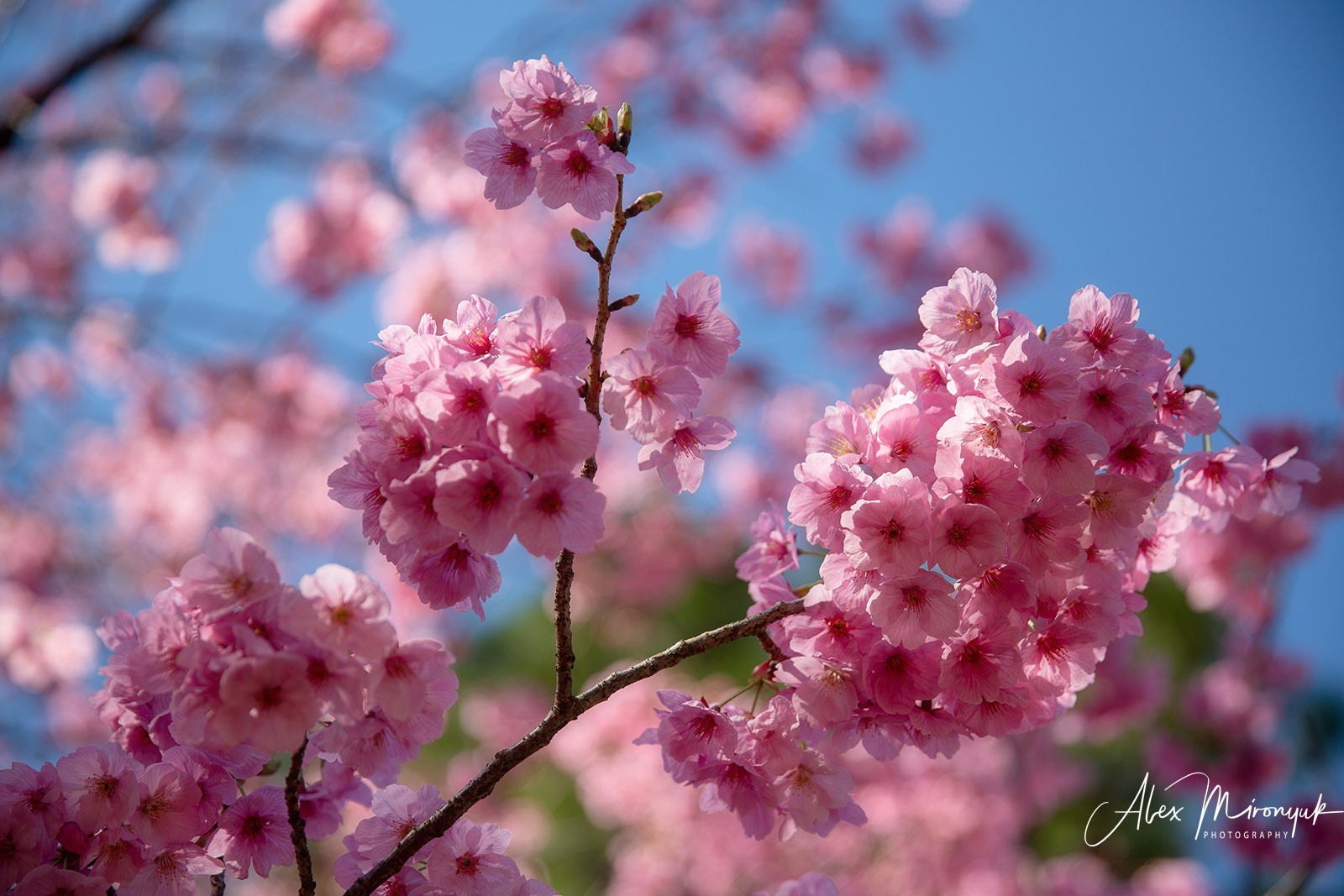Hanami Season in Japan
March 29th — April 7th, 2025
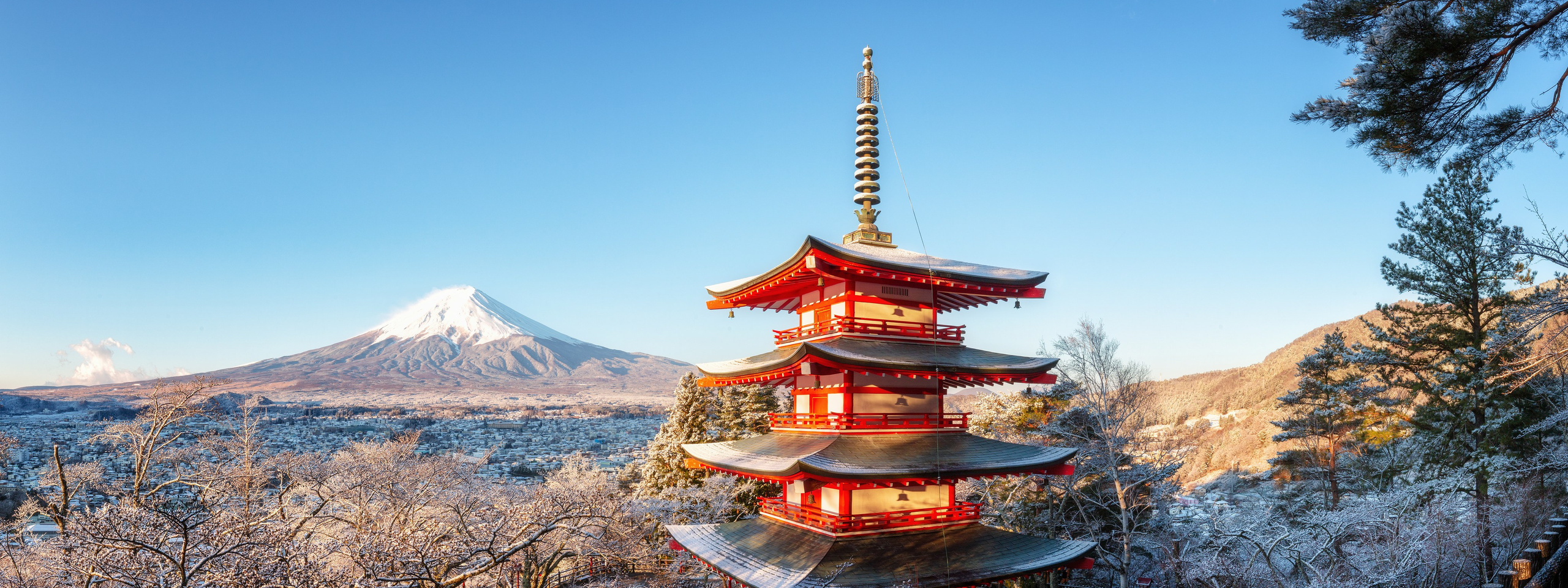
Start Location — Tokyo.
End Location — Osaka
Dates: March 29 — April 7, 2025
Tuition: $ 3750 per participant (early bird price $3550 before 09/01/2024) (limit: 10 participants + 2 guides).
Instructor: Alex Mironyuk, Elena Kukhareva
Deposit: $ 600 (payments accepted for the remainder of the balance)
Tour Highlights
Hanami, or cherry blossom season, is one of the most magical times to visit Japan. From late March to early May, the country transforms into a sea of delicate pink and white flowers as cherry trees bloom across the landscape.
Hanami (花見), which means “flower viewing” in Japanese, is a traditional practice of enjoying the beauty of cherry blossoms (sakura).
We will be enjoying Hanami during our upcoming Japan trip! Get ready to experience one of Japan’s most magical and cherished traditions — the breathtaking beauty of cherry blossoms in full bloom.
Prepare for an unforgettable journey filled with Japan’s enchanting sights and cultural richness during the Hanami season.
We can’t wait to share this incredible experience with you all. See you under the cherry blossoms! 🌸
We will try to maximize all photo opportunities during our trip, so be ready to leave our hotels before sunrise to hop on the first bus or train to get to some locations as early as possible.
We will use public transportation to reach all places in our itinerary, except the Fuji-Kawaguchico region (around Mount Fuji), where we will ride a minivan.
During our trip, we will visit Tokyo, Mount Fuji, Kyoto, Nara, Okayama, and Himeji.
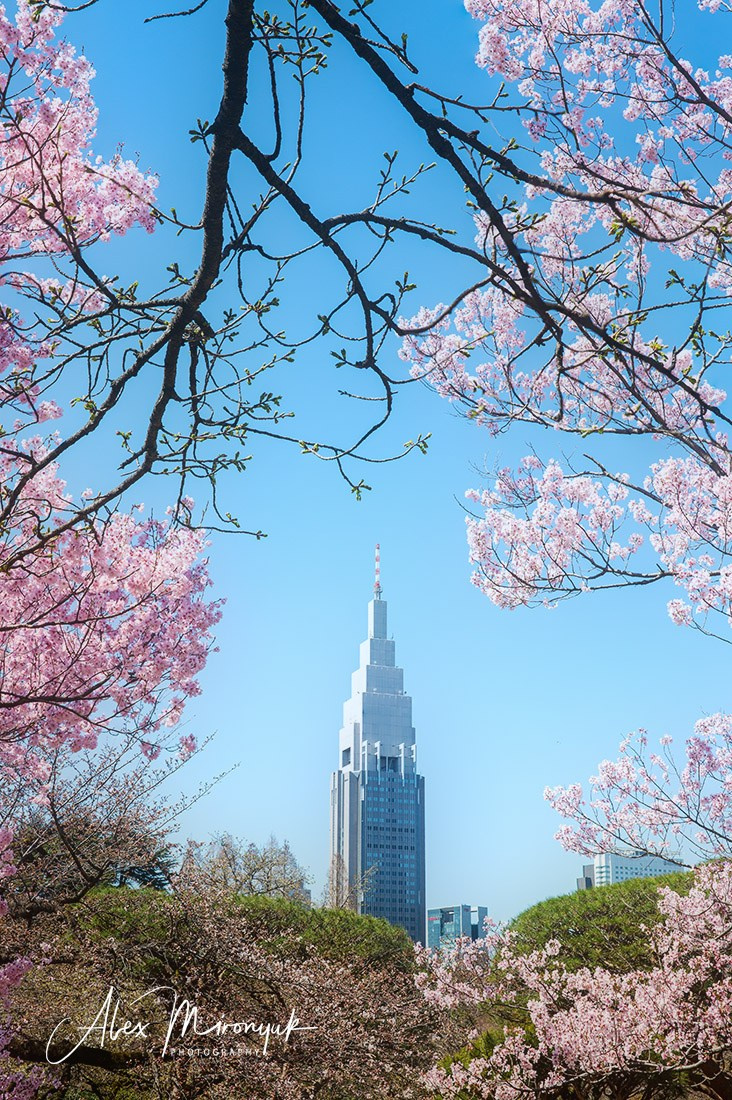
Lodging: hotels are included (double occupancy). For single-occupancy lodging, please send us a request ASAP. All hotels are 2-3 stars with regular amenities (nothing fancy or luxurious) — most of the time, we will be outdoors, and we won’t have extra time to enjoy hotels' pools, spas, etc. Most Japanese hotels' rooms are small and tight, so only one place for your suitcase will be under your bed.
Meal: is not included in the price. In most of our hotels, we can order breakfast and dinner. In addition, we will always be near some restaurants or supermarkets, where we can buy breakfast, lunch, or dinner.
Transportation: We will use public transport in Japan, such as local trains, buses, taxis, and the famous Shinkansen bullet trains. All Public transportation expenses are not included in the tour price. On average, be ready to spend $150-250 for trains and buses during this trip. If you plan to return home from Tokyo, we suggest you order a 7-day JR pass ($331 value) before that trip. All participants must have small bills (1000 yens) and coins to pay for the ride on the buses. In the Fuji-Kawaguchico region, we will rent a minivan, which is included in the tour’s price.
Luggage: we will travel with our luggage. Japan is the perfect place to travel on public transportation with a suitcase. At every train station, we can find a luggage locker to leave our luggage while exploring the city securely (we will use this service 2 or 3 times). So for this trip, you must have a suitcase on wheels. We strongly suggest you pack all your stuff into only one suitcase — that makes your travel in Japan hassle-free and enjoyable.
Admission tickets to all temples, gardens, etc., are included in the price.
Physical activity level: easy to moderate. We will walk a lot. Even if it is a city walk, the total walking distance for a day might be more than 10 miles.
Health Insurance: we strongly suggest that all participants buy individual health insurance before that travel covering emergency assistance and COVID-19 treatment.
Itinerary
Day 0
We will have a ZOOM meeting no later than March 1, 2025, to cover the most common questions about our travel.
- transportation and how to buy metro-pass, train, and bus tickets;
- how to get from an airport to the hotel on the first day;
- where you can exchange currency (yes, we will need cash);
- traveling with luggage and using lockers at train stations;
- cellphone coverage and data service in Japan;
- which smartphone APPs will be helpful during our trip;
- What do you do if you get lost or miss the train?
Day 1. March 29. Saturday
Everybody arrives in Tokyo. Self-transfer to our hotel — Hotel Villa Fontaine Tokyo — Otemachi, 1-8-8 Uchi Kanda, Chiyoda-ku, Tokyo, Tokyo-to, 101-0047 Japan.
For everyone who will get to our hotel before 4 pm, we will go for an evening walk in Tokyo.
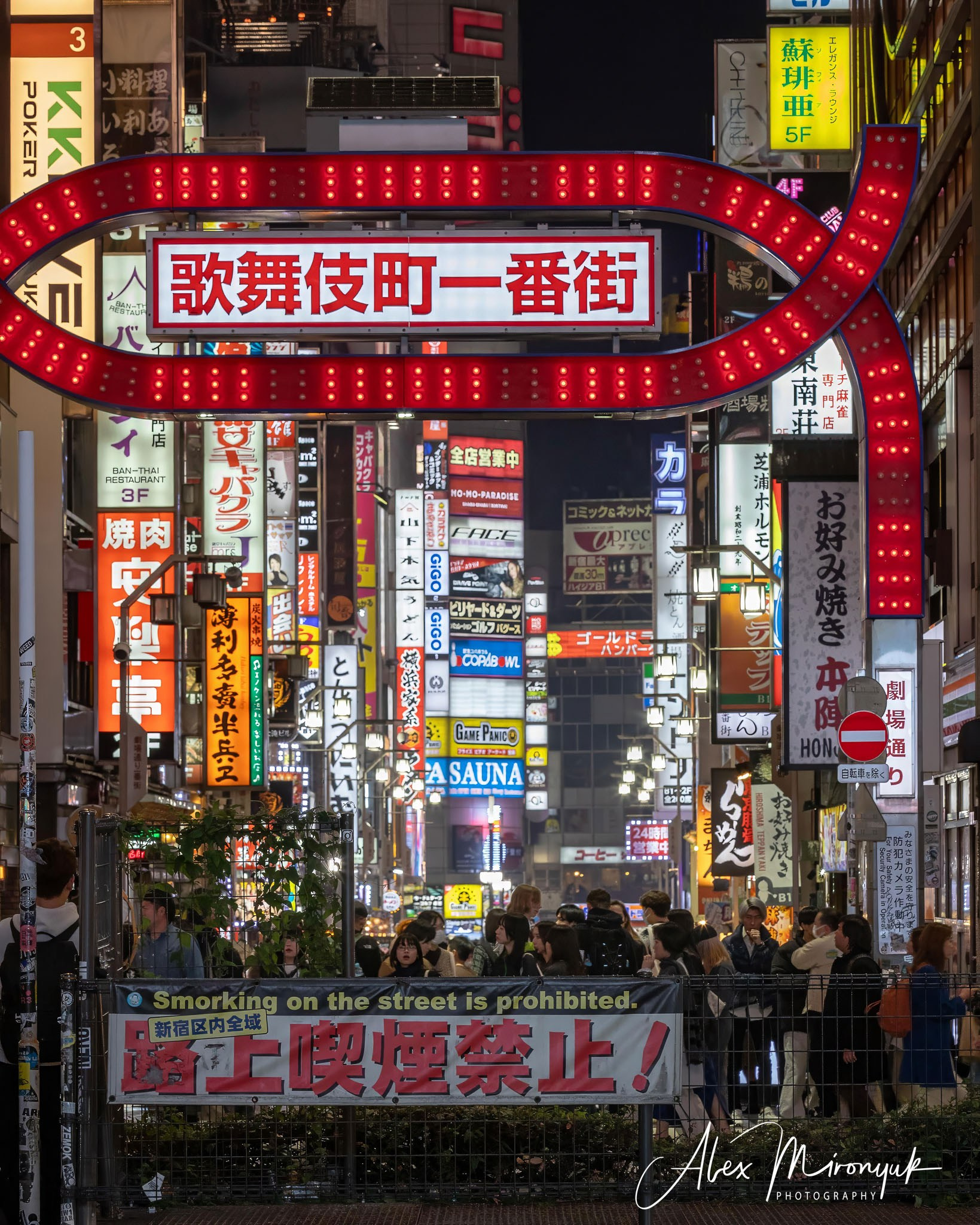
Day 2. March 30. Sunday.
Early in the morning, on the first train, we will get to the northern part of Tokyo, one of the best places to enjoy hanami along the small river. This place is not so popular, and Instagram influencers perhaps don’t know it, but you will be genuinely excited about it. It won’t be crowded at all this time of the day. Here, we will spend about 1,5 — 2 hours and have breakfast after this morning’s walk in one of the countless local restaurants.
In the afternoon, we will go south of Tokyo and visit Hamarikyu Gardens, right on the Sumida River bank.
From there, we will take a ferry to Odaiba Island, Tokyo’s futuristic entertainment and shopping district, built on an artificial island in Tokyo Bay. Here, we will visit the TeamLab Borderless — digital art experience like no other at this interactive, borderless museum where art comes alive and moves with you.
Believe you or not, here, on Odaiba Island, we can find… Statue of Liberty!!!! This monument will be our photo subject for the afternoon photo session.
Close to 4 PM, we will go to Shinjuku district to climb one of Tokyo’s skyscrapers and see the beautiful sunset over Tokyo. If the weather cooperates, we will have a chance to see Mount Fuji.
From there, we will ride back to our hotel, have a night walk around the city, and have dinner at a local sushi place.
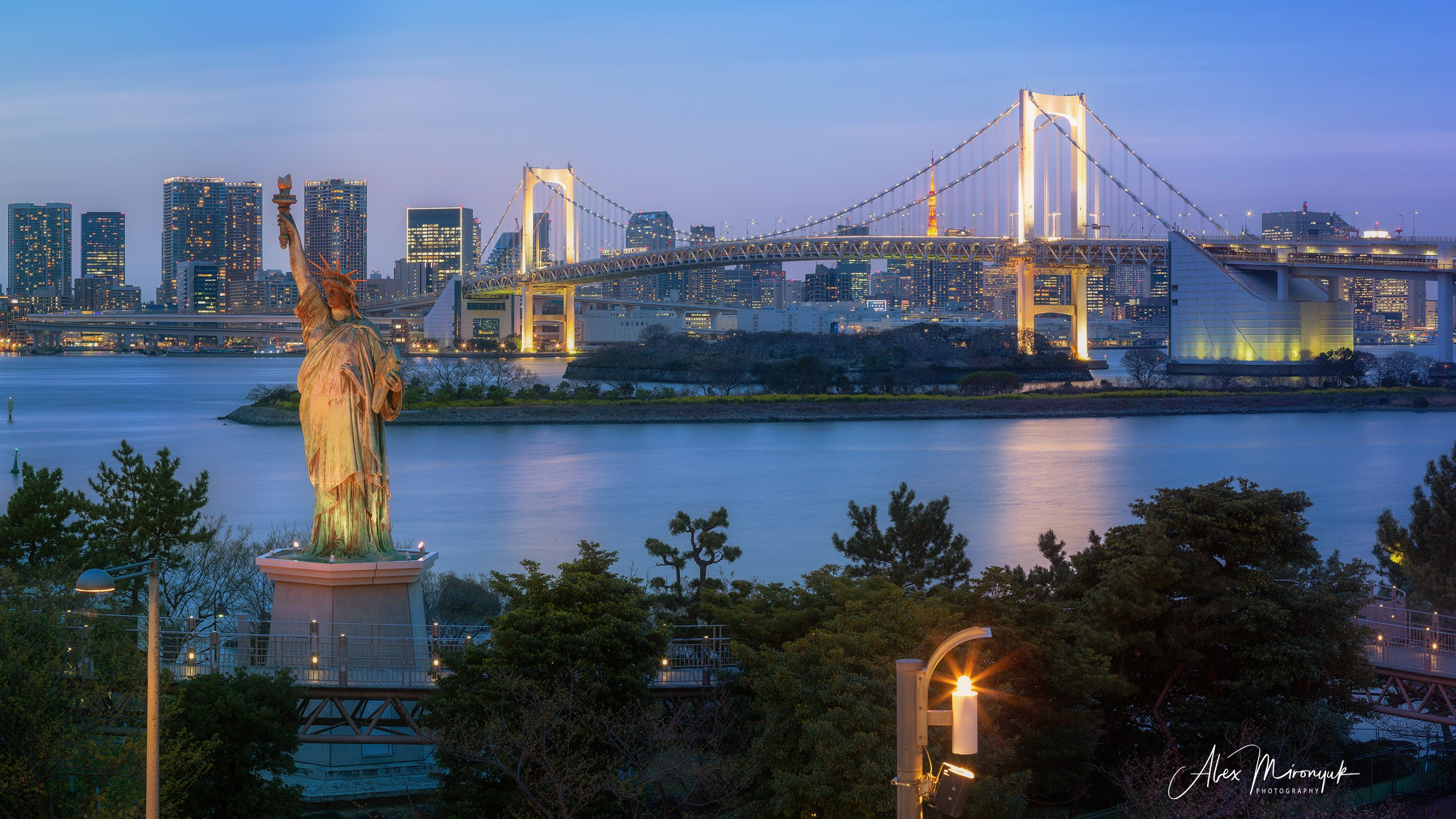
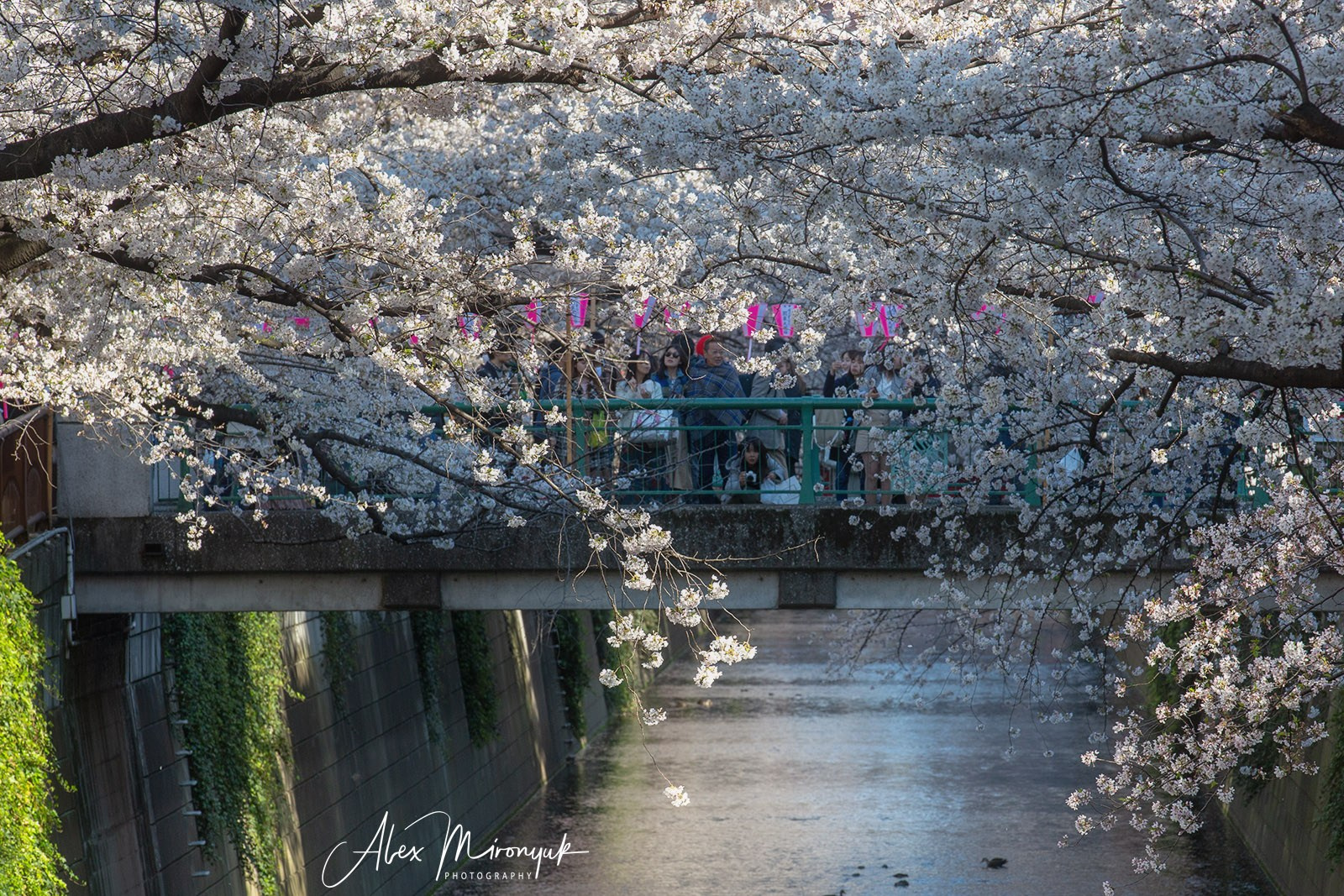
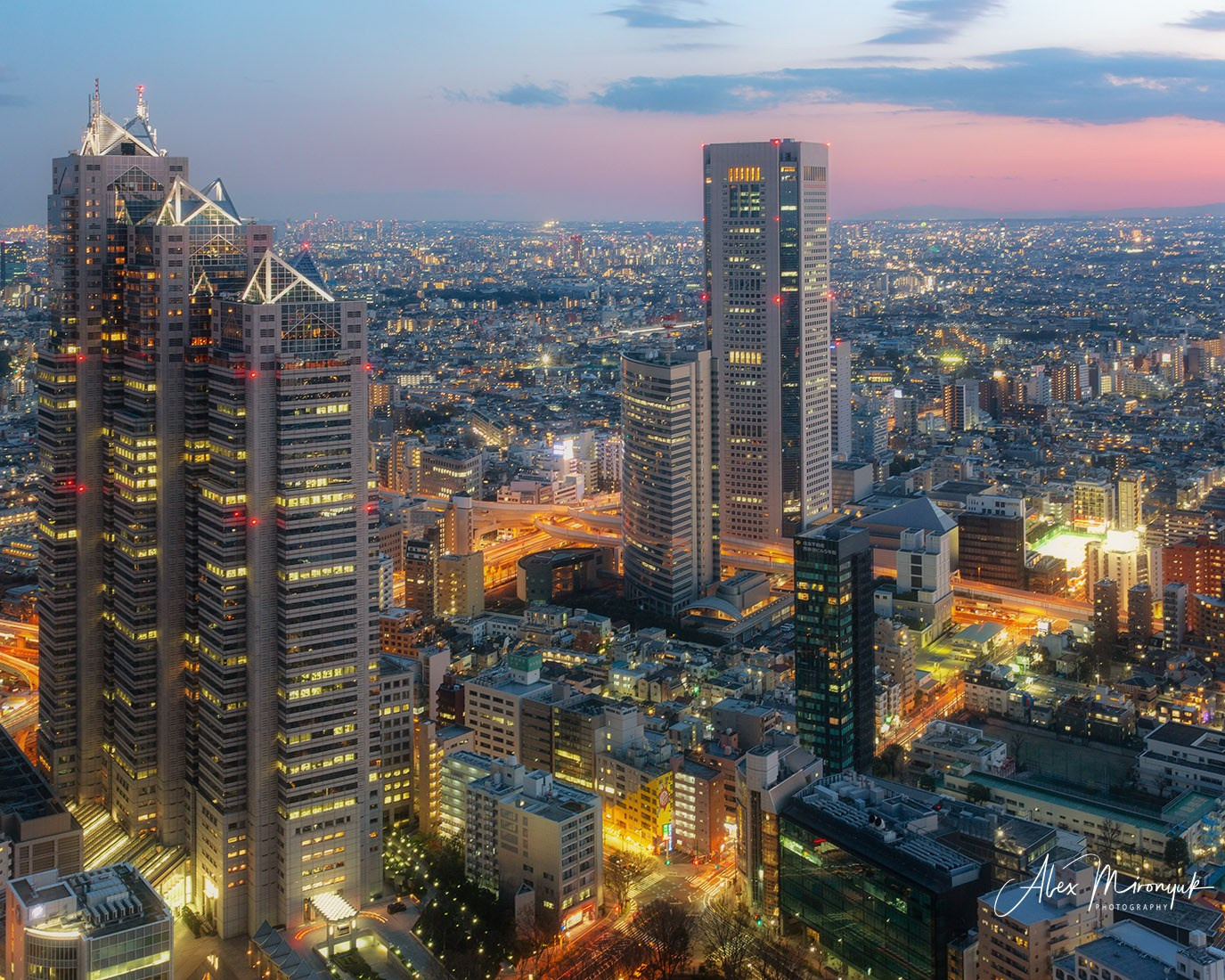
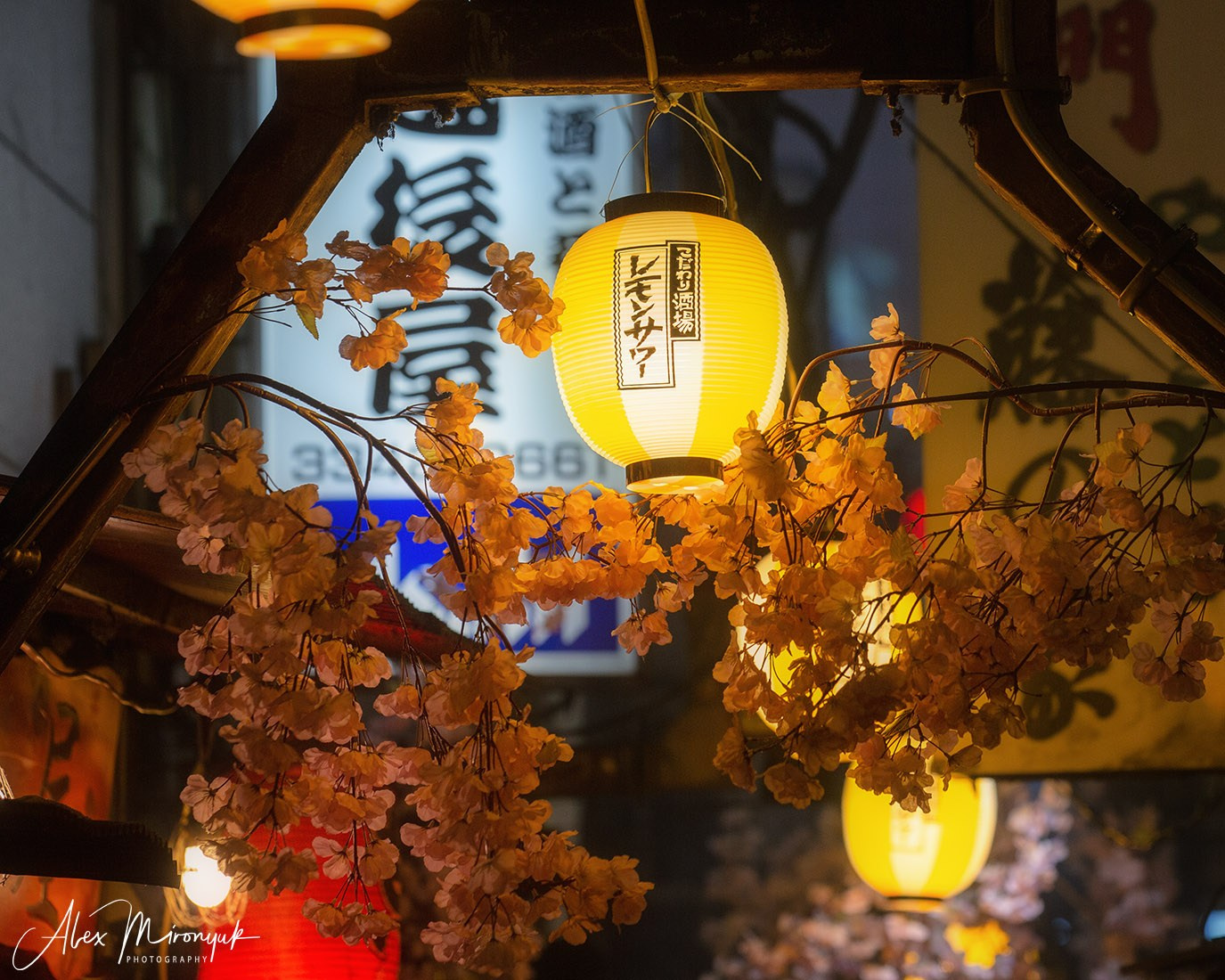
Day 3. March 31. Monday.
This morning, we will spend time at Imperial Palace East Gardens. This beautiful and historic site offers a peaceful escape from the bustling city, with lush landscapes, ancient ruins, and meticulously maintained gardens.
Our next stop will be Shinjuku Gyoen National Garden — one of the best Tokyo gardens with cherry trees.
After that, we will go to the Meiji Jingu Gyoen garden. It is located adjacent to the famous Meiji Shrine. This beautiful garden is a must-visit for anyone seeking peace and relaxation in the heart of the metropolis.
From here, we will get to another of Tokyo’s famous places —Shibuya Crossing. This intersection is the world’s busiest pedestrian scramble and an iconic symbol of Tokyo’s vibrant energy.
Late afternoon and first dark hours of this busy day, we will spend on the banks of the Meguro River. This is one of Tokyo’s most picturesque hanami spots. Each spring, the riverbanks transform into a stunning tunnel of sakura, creating a magical atmosphere that attracts visitors from all over. The cherry blossoms are illuminated at night with soft, glowing lights, adding a romantic and ethereal touch to the experience. The contrast of pink blossoms against the blue sky or illuminated at night makes for stunning photos.
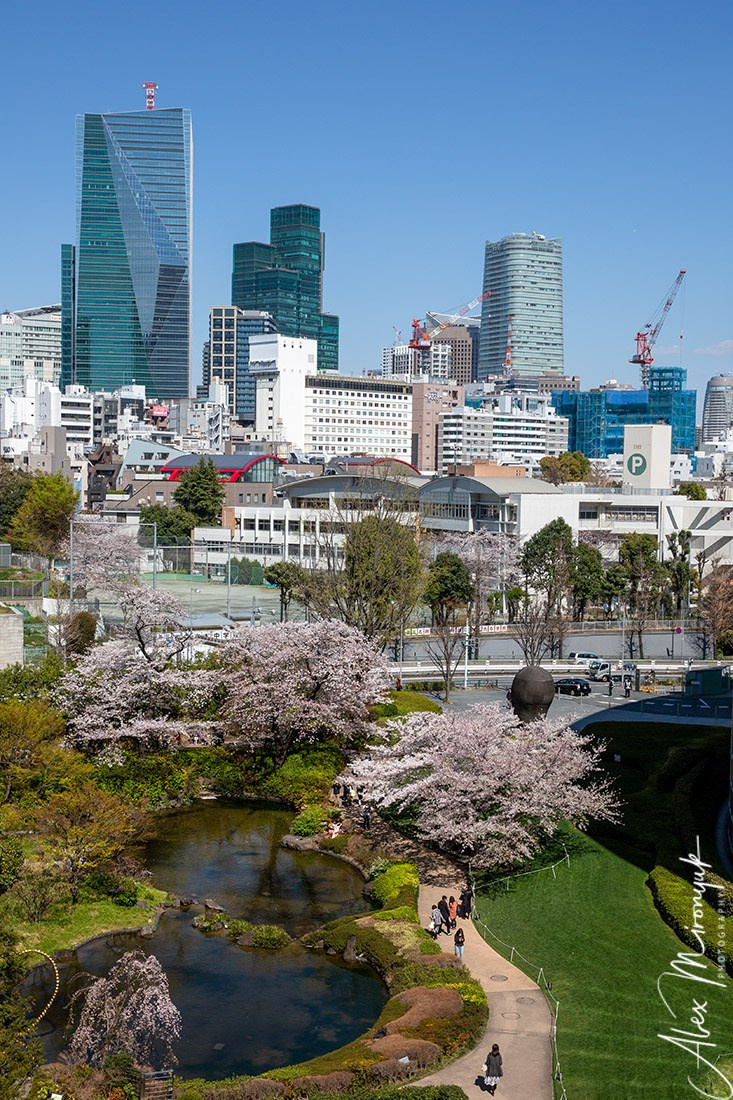
Day 4. April 1. Tuesday.
In the morning, we will check out of our hotel and ride a train to the base of Mount Fuji. It will be a long ride for about 3 hours or so.
After renting our minivans, we will visit a charming, traditional Japanese village on the shores of Lake near Mount Fuji. The village features beautifully restored thatched-roof houses now serving as museums, shops, and galleries. We can immerse ourselves in the cultural heritage by participating in hands-on activities such as kimono dressing, pottery making, and soba noodle making. The serene surroundings and breathtaking views of Mount Fuji make this village a perfect photo destination.
We found a hidden gem near Mount Fuji for our sunset, with picturesque views and a serene atmosphere. Here, in clear water, we can find the stunning reflections of Mount Fuji, which can be seen on calm days.
Night in Fuji Kawaguchico
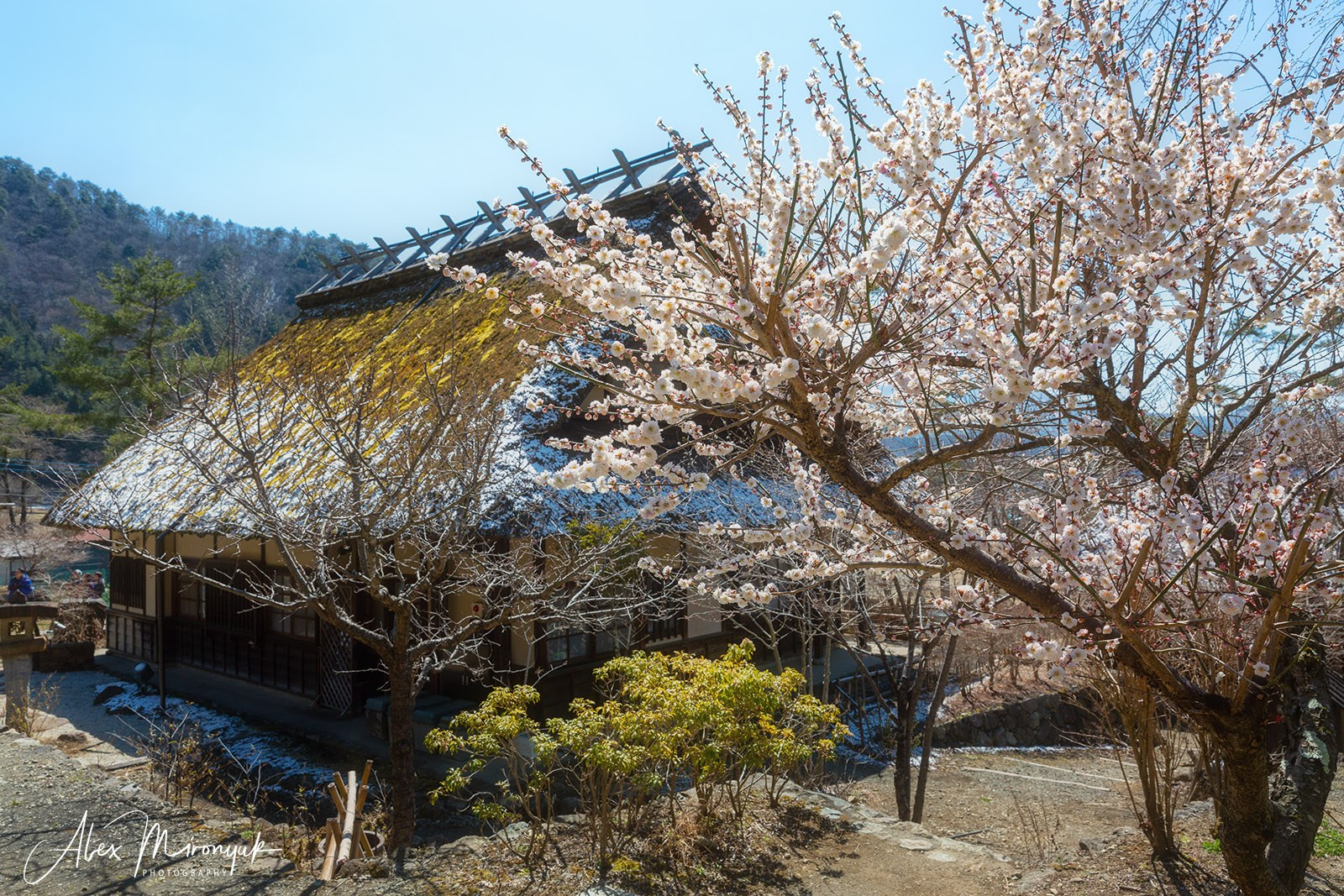
Day 5. April 2. Wednesday.
Today, we will have a mandatory sunrise walk to the Chureito Pagoda. This iconic five-story pagoda has the most famous views of Mount Fuji, especially when framed by cherry blossoms. The hike up the 400 steps to the pagoda is well worth it for the breathtaking panoramic views of Mount Fuji and the surrounding area.
For the rest of the morning, we will spend around Five Lakes with stunning views of Mount Fuji.
In the afternoon, we will take a train to Kyoto.
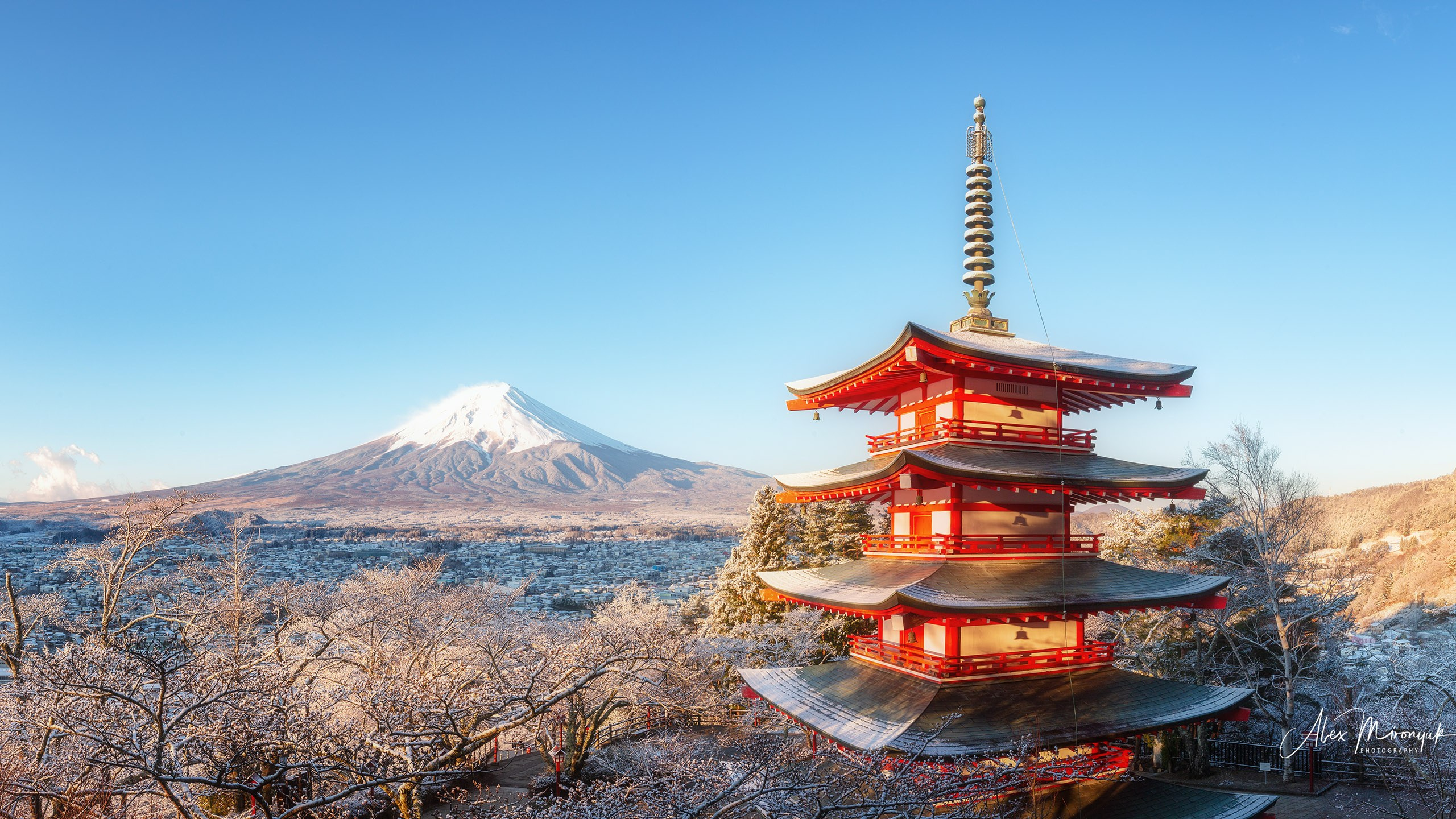
Day 6. April 3. Thursday.
Today, we will explore one of the most famous districts of Kyoto — Arashiyama. We will try to hop on the first train to get there as early as possible to avoid regular tourist crowds.
During the day, we will visit several fantastic temples: Tenryuji Temple, Hogon-in Temple, Jojakko-ji Temple, Gio-ji Temple, Adashino Nenbutsu-ji, Otagi Nenbutsu-Ji, Daikaku-ji Temple. Every temple has its beautiful garden full of white and pink colors at this time of the year.
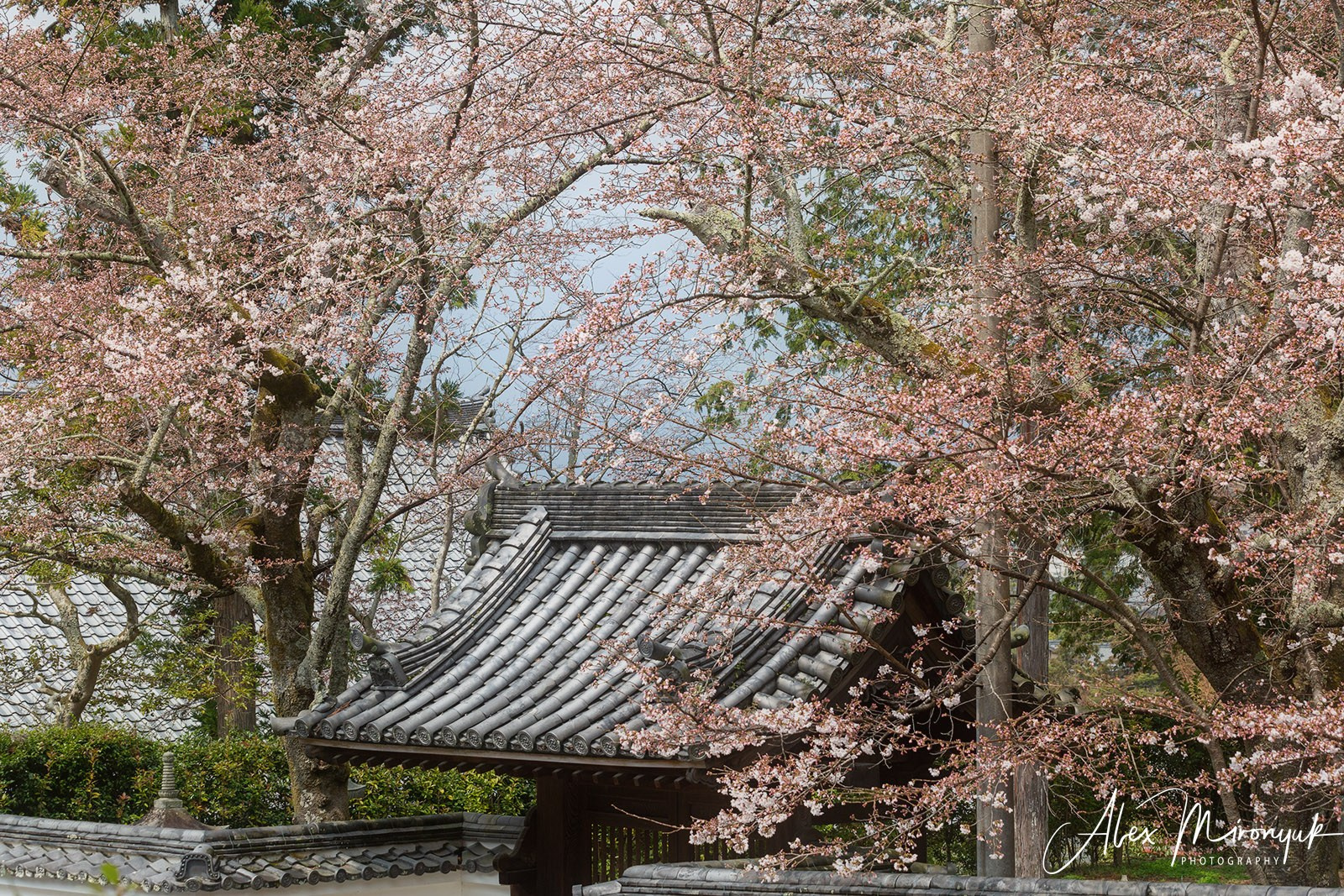
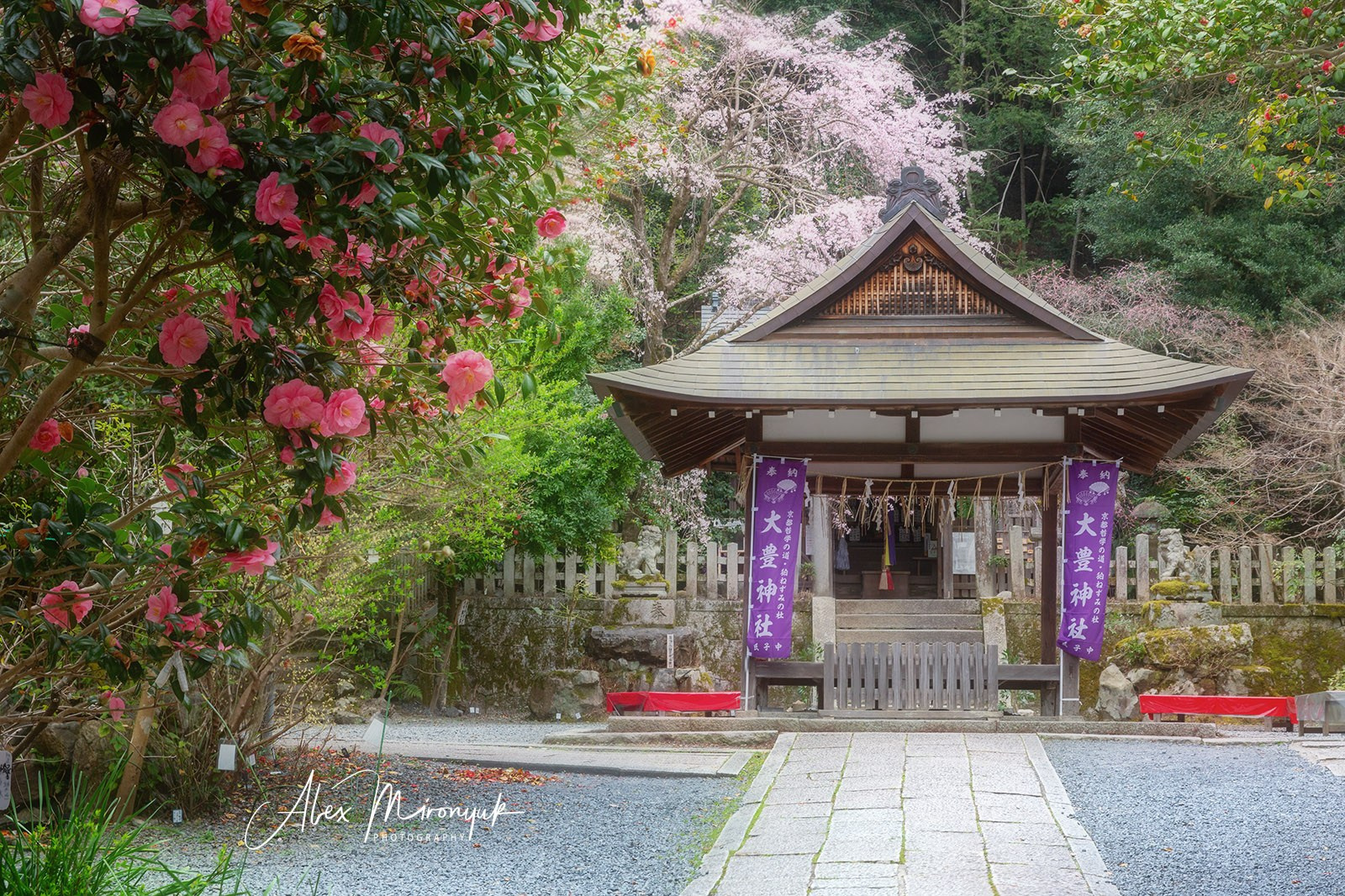
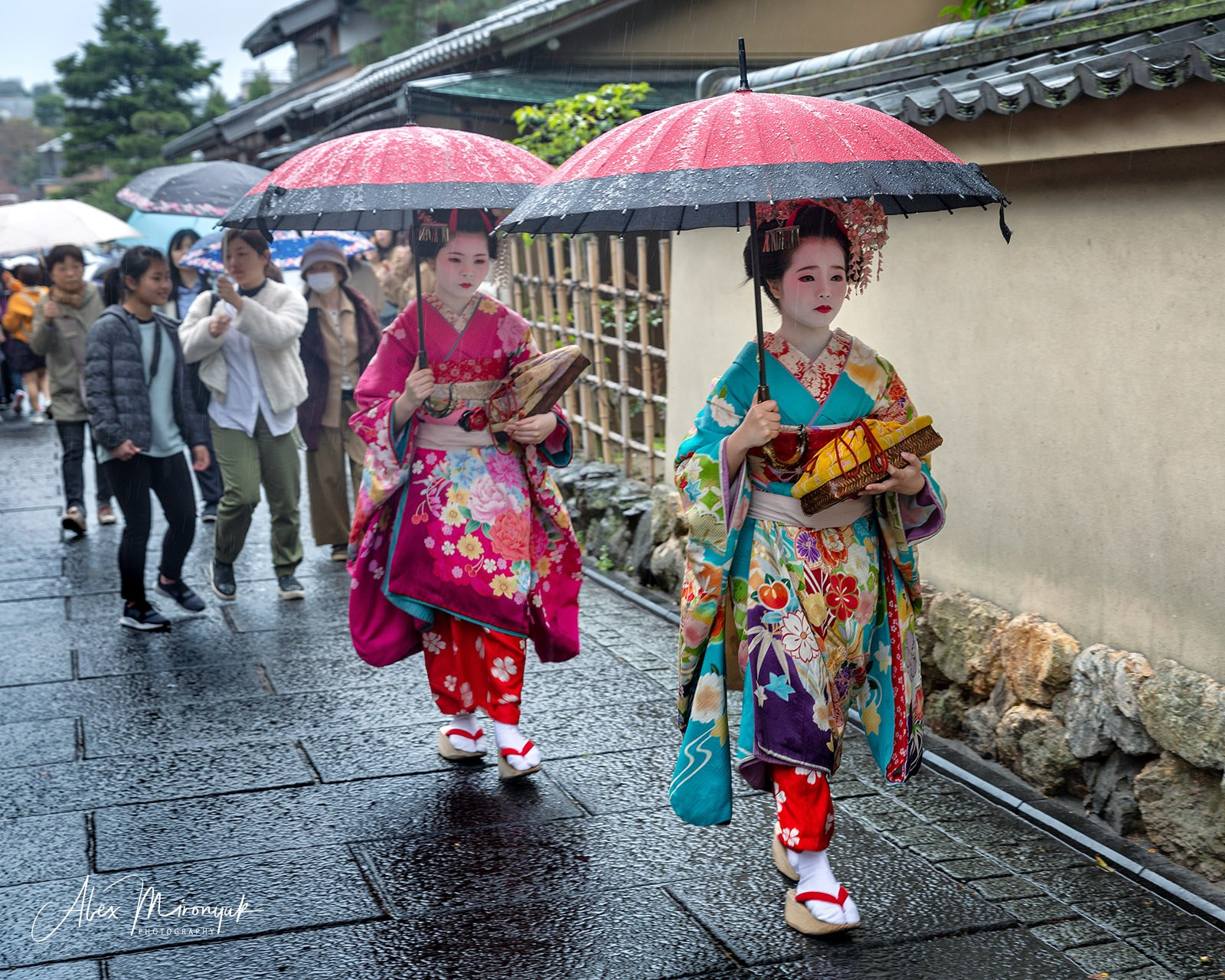
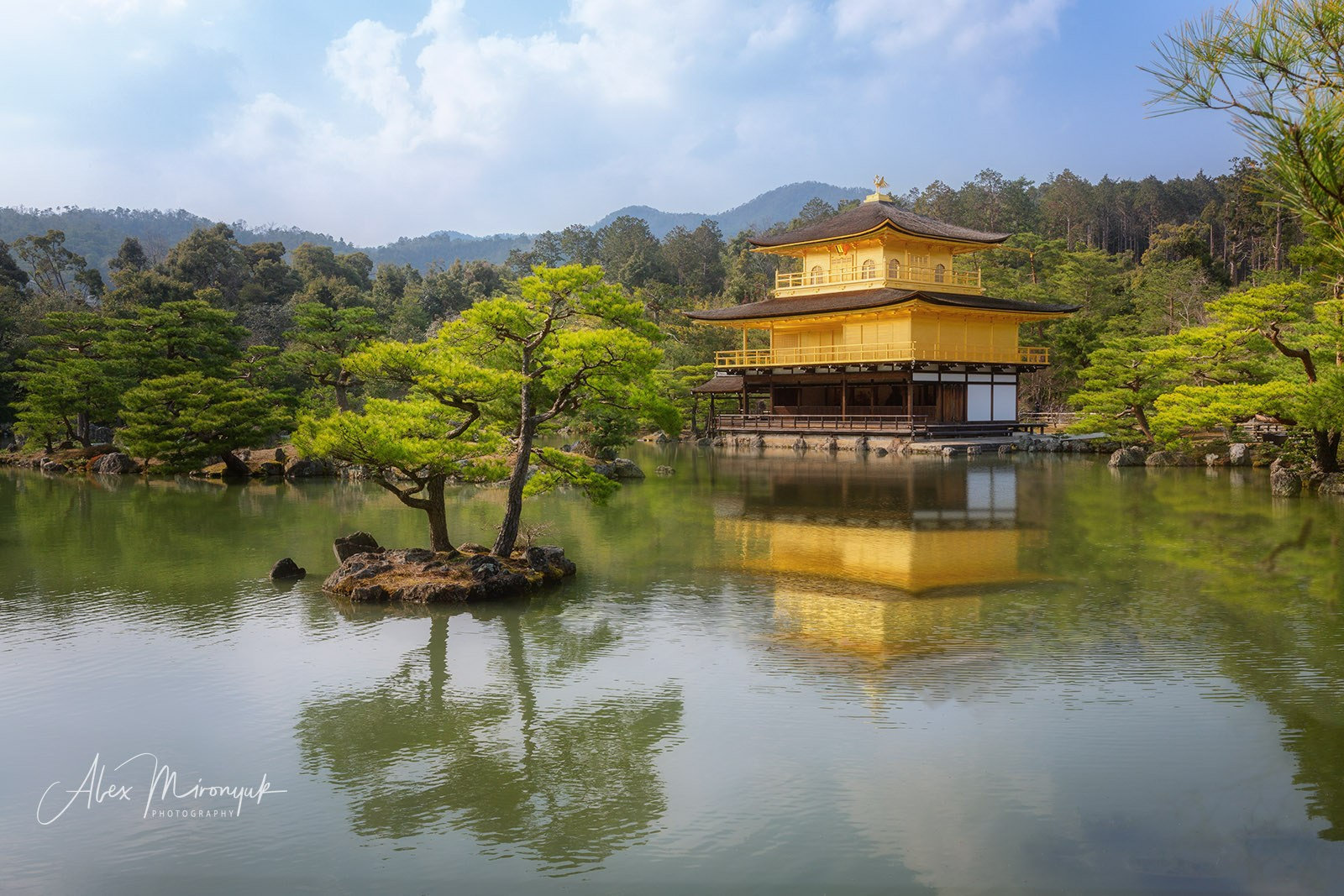
Day 7. April 4. Friday.
First thing in the morning, we will go perhaps to the most famous and crowded place in Tokyo — the Golden Pavilion (Kinkakuji). It has burned down numerous times throughout its history. The present structure was rebuilt in 1955. Kinkakuji’s top two stories are covered in gold leaf. Its shining surface reflects into the Kyoko-chi or Mirror Pond.
After visiting this most visited place, we will get to the Higashiyama District in the historical center of Kyoto. Here again, we will visit several temples and gardens. But most importantly, we will walk on the world-famous Philosopher Path through hundreds of blooming cherry trees. At the end of this path, we will get to the most Instagram places at this time of the year — Keage Incline.
We couldn’t miss the famous Gion district of Kyoto, known for its charming historical atmosphere and strong ties to the world of traditional Japanese art. Gion is, of course, most famous for spotting geisha, or geiko, as they are known in Kyoto. Here, we can find several facilities where you can rent a traditional Japanese kimono and walk on the streets of Kyoto in these outfits.
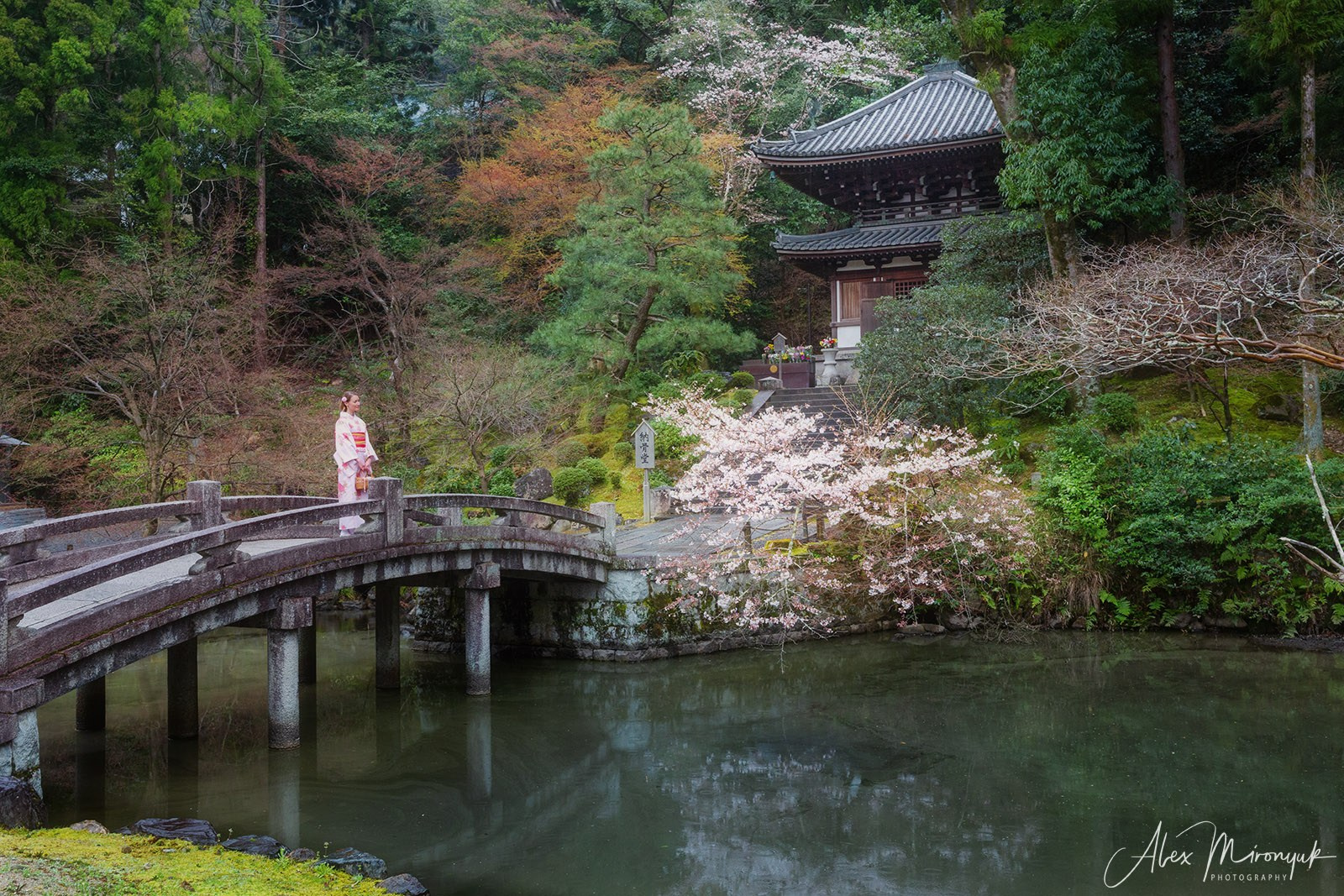
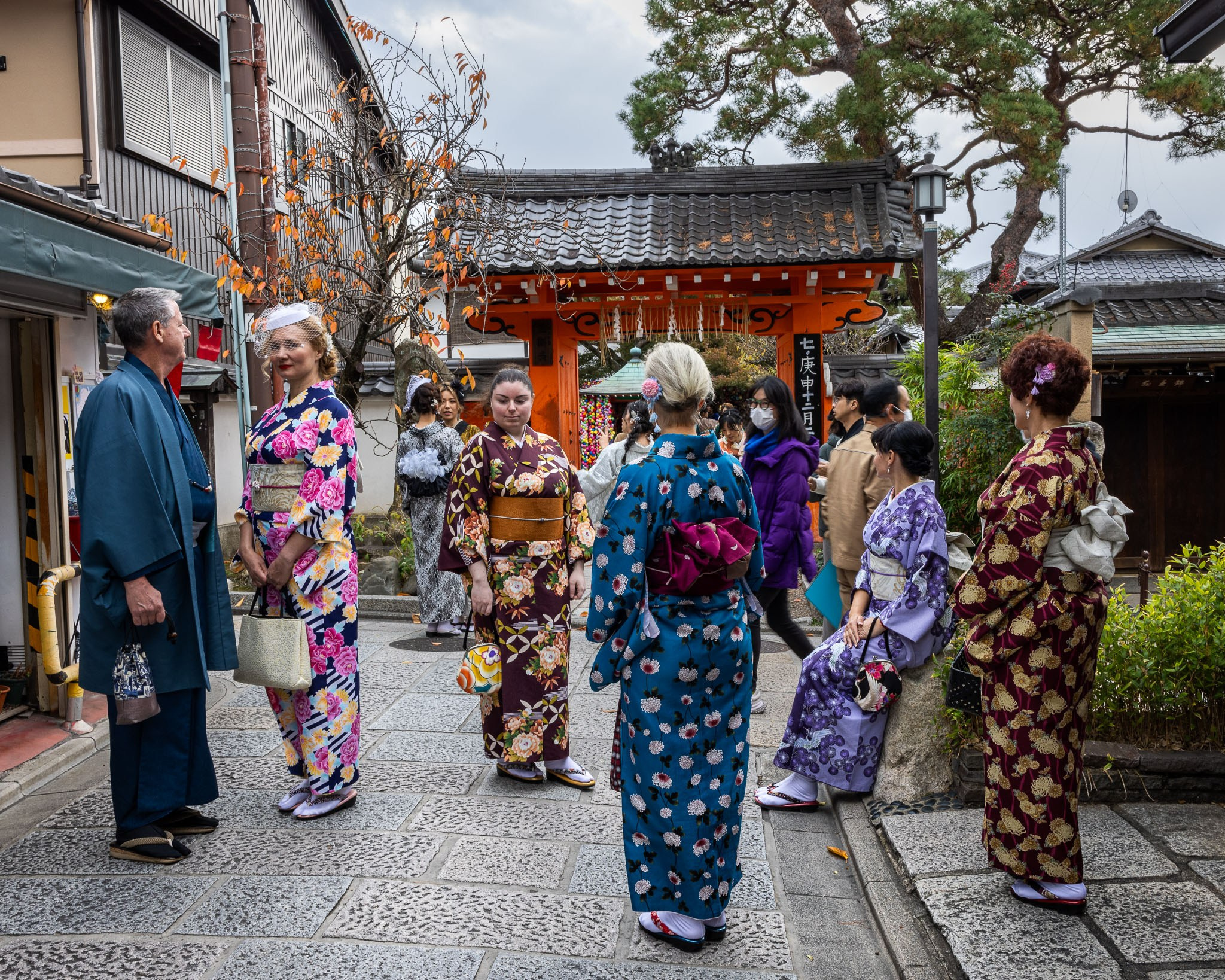
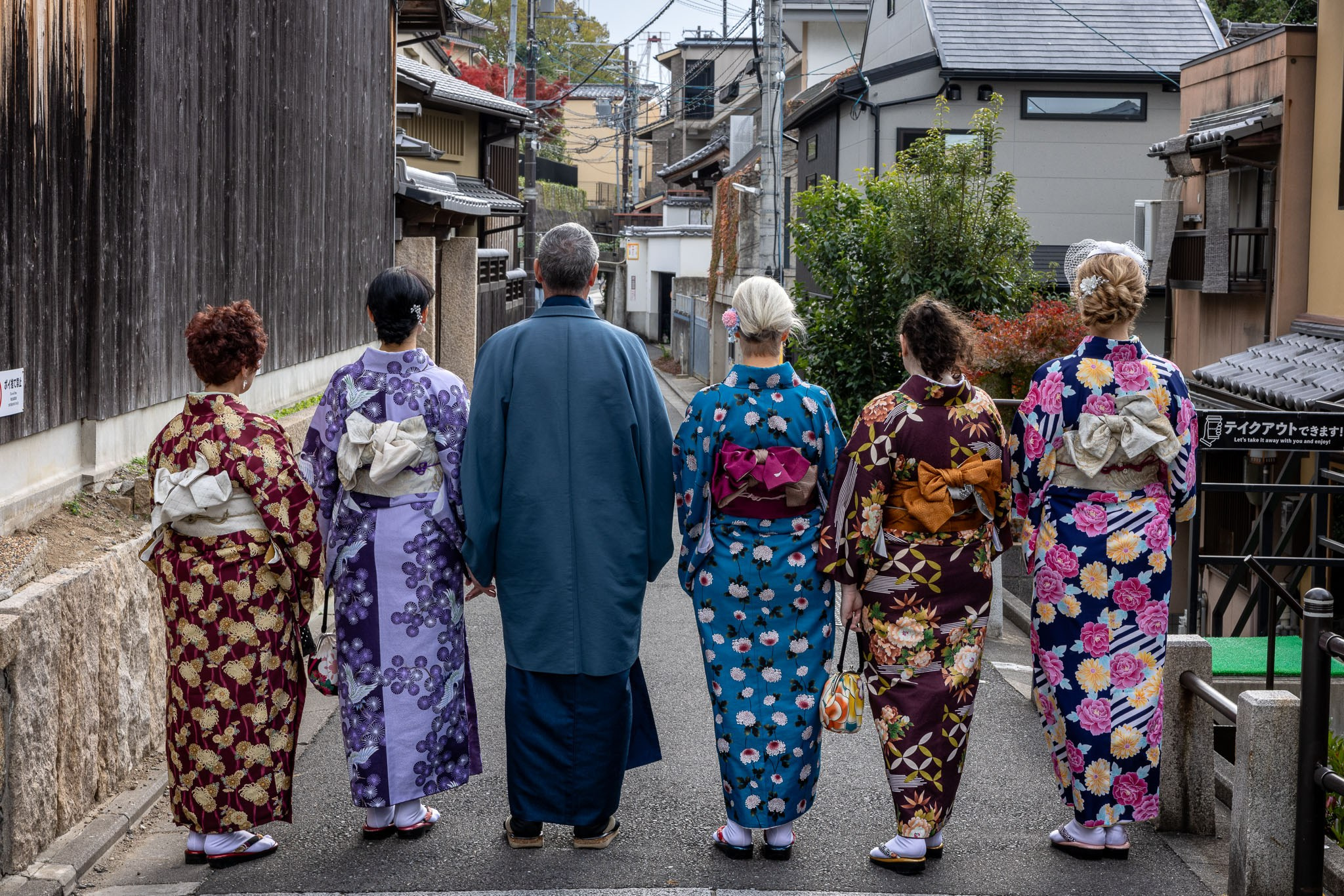
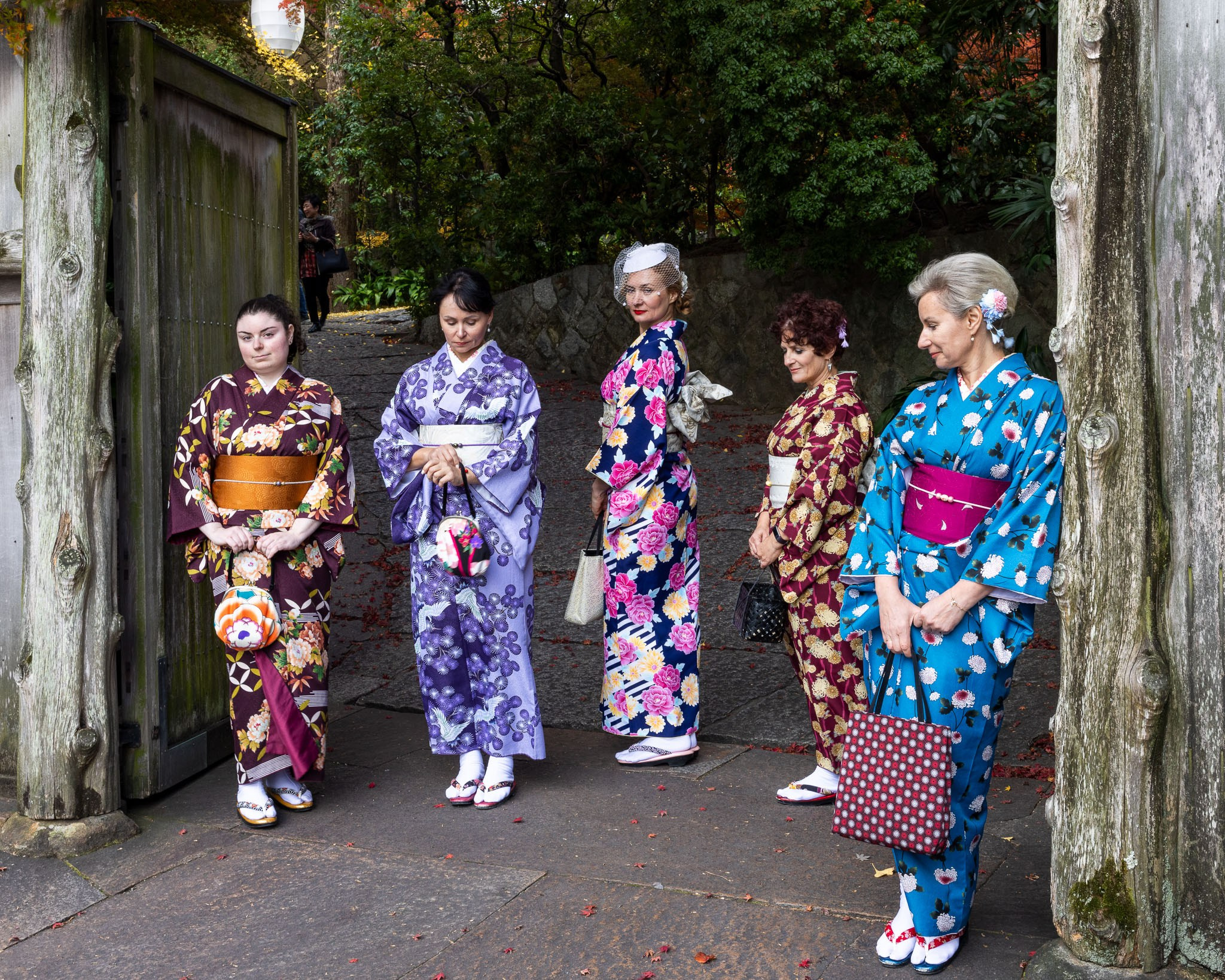
Day 8. April 5. Saturday.
We will get to the first train early in the morning, leading us to another famous Kyoto tourist attraction — Fushimi Inari Shrine (Tofuku-ji). We will get to the thousands of red shrines without the usual tourist crowd and will get a chance to take our pictures at a relaxing pace for about 30-40 minutes or so.
After breakfast, we will pick up our luggage from the hotel and hop on a bullet train to Okayama. Here we will visit the historical Black Castle. It was constructed in 1597 and boasts a unique architectural style with its black-painted wooden walls and golden gilded ornaments. During hanami season, the contrast between the castle’s somber elegance and the delicate pink cherry blossoms creates a stunning visual spectacle. Another point of interest in Okayama would be one of the most beautiful Japanese gardens — Korauken. During hanami season, Korakuen becomes a picturesque haven with cherry blossoms adding a soft pink hue to the verdant landscape.
We will visit one of Japan’s most iconic and best-preserved castles in the afternoon — Himeji Castle. Himeji Castle is also known as the “White Heron Castle” due to its brilliant white exterior and graceful architecture. During hanami season, the castle grounds are adorned with cherry blossoms, providing a breathtaking backdrop of pink blooms against the castle’s pristine white walls. Here, we will stay till sunset and return to Osaka in darkness.
We are staying in a hotel in Osaka.

Day 9. April 6. Sunday.
In the morning, we will visit one of Japan’s most famous landmarks — Osaka Castle. During the Hanami season, it becomes even more enchanting. Surrounded by a vast park with over 600 cherry trees, the castle provides a stunning backdrop for the delicate pink blossoms.
After breakfast, we will get on a train to Nara. Nara is Japan’s first permanent capital. Due to its historical importance, the city remains full of cultural treasures, including some of Japan’s oldest and largest temples. We will visit some of them this afternoon, including the most famous Todaiji Temple with its gigantic Buddha statue.
And we couldn’t miss Nara Park, where we can spot over 1000 deer. These deers in the park have become one of Nara’s symbols nowadays.
We will walk on Kasuga Taisha, which is famous for its lanterns. Hundreds of bronze lanterns can hang from the buildings, while many stone lanterns line their approaches.
After Nara’s walk, we will return to the train station to hop on our train to Osaka.
We are staying in a hotel in Osaka.
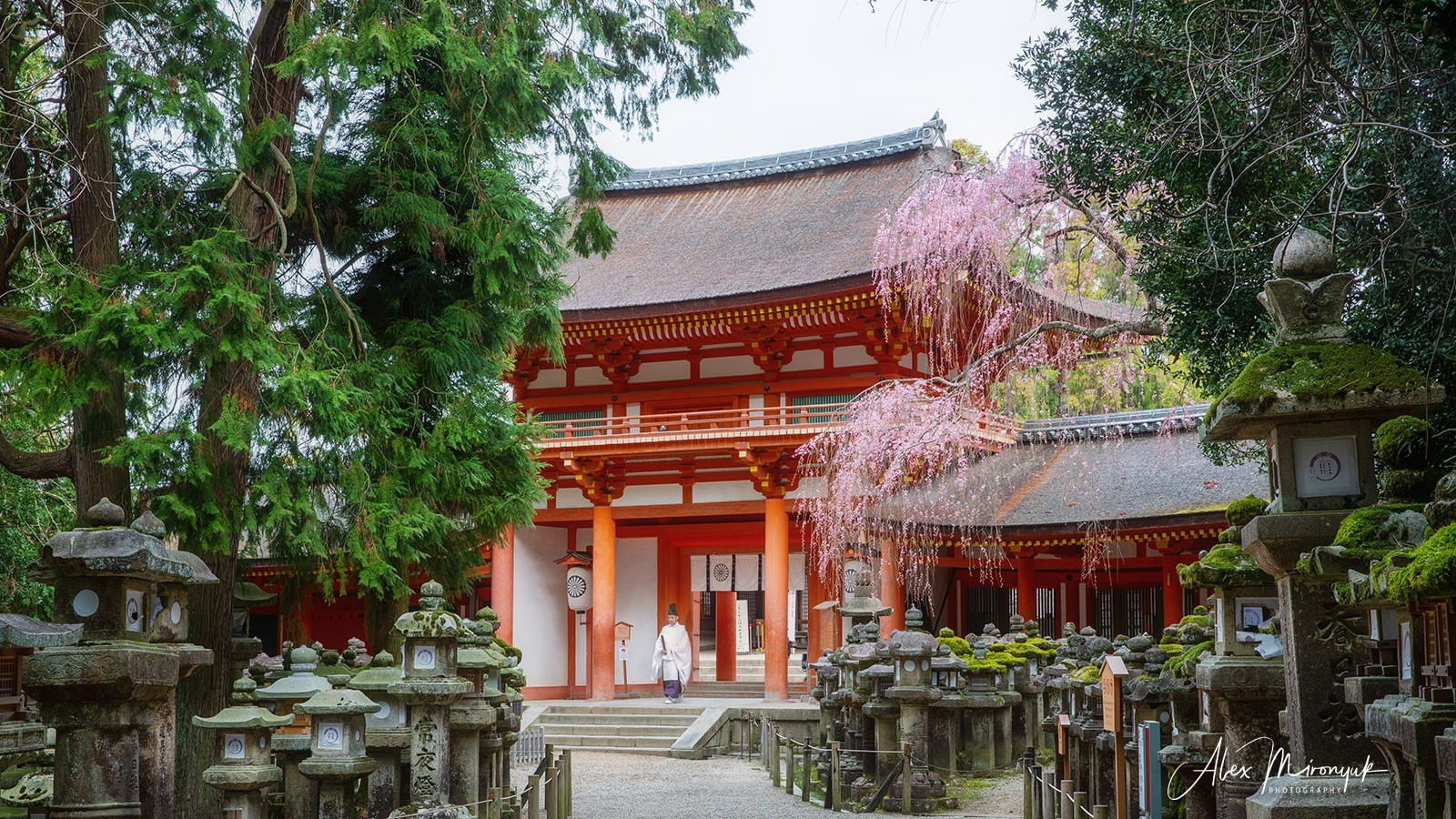
Day 10. April 7. Monday.
Participants check out from their rooms and go to the airport.
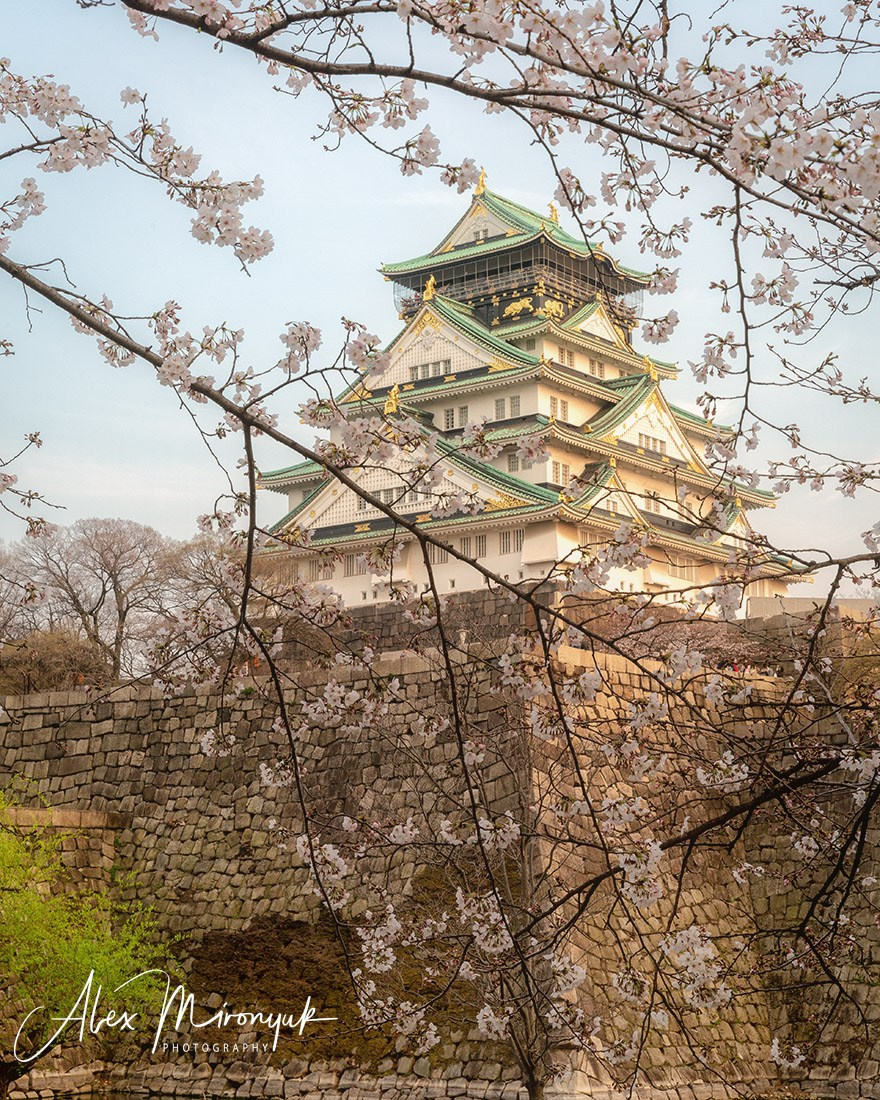
Payment schedule and cancellation policy:
The total price for the tour is $ 3750 per person (early bird price $3550 before 09/01/2024)
A deposit of $ 600 is required to reserve a space on this tour.
Cancellation Policy — If you decide to cancel this trip before 12/29/2024, we will refund your deposit. If you cancel your trip after 12/29/2024, your deposit becomes non-refundable. So we suggest all participants buy separate travel insurance.
The final balance is due by December 29, 2024, and there will be no refunds on the total amount owed if you cancel after the final payment. However, if we find another client to fill your space, you will receive a full refund minus your deposit.
If we cancel this tour — you will get a full refund.
What is included:
- The hotel lodging (double occupancy). If you want to upgrade your stay from double occupancy to single occupancy for an extra fee, let us know at least 90 days before the tour’s dates (subject to availability).
- Expert instructions and guidance to a beautiful variety of locations in Japan.
- Entrance tickets to all temples, gardens, and parks per the itinerary.
- Transportation in Fuji-Kawaguchico district (minivan)
- An incredible, unforgettable experience, full of adventure with amazing people and loads of great photos!!
What is NOT included:
- Meals, snacks, and water. Breakfasts in hotels are not included but can be ordered separately.
- Alcohol.
- Transportation (except in Fuji-Kawaguchico). We will use public trains and buses. All Participants must buy a metro card (Welcome Suica Card) and train tickets before each ride.
- Internet and cell phone coverage. All participants must have a reliable data service to connect with their guides, especially when they might get lost.
- Medical Insurance & Incidental Costs.
Questions? Please get in touch with me at (386) 627-1449 if you have any questions or message me.
A follow-up email will be sent to registered photographers with schedule details, recommended gear, and a liability release.
